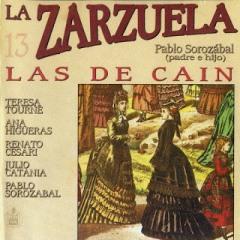Pablo Sorozabal - Las de Cain (1965)
Pablo Sorozabal - Las de Cain (1965)

01 Preludio 02 Terceto 03 Cuarteto 04 Duo 05 Final del acto I 06 Preludio del acto II 07 Romanza 08 Concertante 09 Numero de D. Segismundo 10 Cuarteto 11 Final del acto II 12 Preludio del acto III 13 Romanza 14 Duo 15 Final del acto III Rosalia - Teresa Tourne Marucha - Ana Higueras Amalia - Caridad Vasco Estrella - Alicia de la Victoria Fifi - Maria Aragon Doña Elvira - Charlito Gimenez Alfredo - Renato Cesari Tio Cayetano - Julio Catania Peín - Segundo Garcia Don Segismundo - Luis Frutos Marín - Ramon Regidor Tomás - Tomas Cabrera Orquesta de Conciertos de Madrid Pablo Sorozábal – director
Sorozábal’s artisan family moved from the Basque countryside to San Sebastián a few years before Pablo’s birth on September 18th 1897. He was something of a child prodigy on piano and violin, earning his living in cinemas, cafés and fairgrounds, and playing with the San Sebastián Casino Orchestra under the influential Fernández Arbós. He always regretted having lost his ability to speak the Basque language: "because of the pressures of life and a centralised government policy we were forced to forget our language. I am ashamed of this and still hope, even if only at the end, to speak my dying words in the same language I used to express my first feelings¹"
In 1919 he moved to Madrid, joining the Madrid Symphony Orchestra which performed his Capricho español (1920). His distinctive musical personality was forged by study in Leipzig; and in Berlin, where he preferred Friedrick Koch as composition teacher to Schöenberg, whose theories he disliked. It was in Germany that he made his conducting debut, and the rostrum remained at the centre of his working life.
His Leipzig concert works include the choral Suite vasca (1923); Dos apuntes Vascos (1925) and Symphonic Variations on a Basque Theme (1927); the Siete Lieder, 1929 settings of Heine for mezzo-soprano and orchestra, are perhaps the finest works he produced in Germany. The ballet suite Victoriana (1951); and the powerful Funeral March Gernika for chorus and orchestra (1966) date from his later Madrid days. Two short but powerful compositions for chorus and orchestra, Maite (‘Our Lady’, from the 1946 film Jai-Alai) and ¡Ay, tierra vasca! (1956) retain their place in the hearts of his countrymen. ---zarzuela.net
download: uploaded yandex 4shared mediafire solidfiles mega zalivalka filecloudio anonfiles oboom








